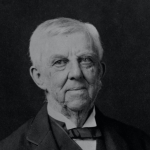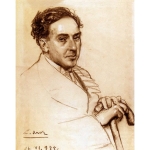My soul and I went to the great sea to bathe. And when we reached the shore, we went about looking for a hidden and lonely place.
But as we walked, we saw a man sitting on a grey rock taking pinches of salt from a bag and throwing them into the sea.
“This is the pessimist,” said my soul, “Let us leave this place. We cannot bathe here.”
We walked on until we reached an inlet. There we saw, standing on a white rock, a man holding a bejeweled box, from which he took sugar and threw it into the sea.
“And this is the optimist,” said my soul, “And he too must not see our naked bodies.”
Further on we walked. And on a beach we saw a man picking up dead fish and tenderly putting them back into the water.
“And we cannot bathe before him,” said my soul. “He is the humane philanthropist.”
And we passed on.
Then we came where we saw a man tracing his shadow on the sand. Great waves came and erased it. But he went on tracing it again and again.
“He is the mystic,” said my soul, “Let us leave him.”
And we walked on, till in a quiet cover we saw a man scooping up the foam and putting it into an alabaster bowl.
“He is the idealist,” said my soul, “Surely he must not see our nudity.”
And on we walked. Suddenly we heard a voice crying, “This is the sea. This is the deep sea. This is the vast and mighty sea.” And when we reached the voice it was a man whose back was turned to the sea, and at his ear he held a shell, listening to its murmur.
And my soul said, “Let us pass on. He is the realist, who turns his back on the whole he cannot grasp, and busies himself with a fragment.”
So we passed on. And in a weedy place among the rocks was a man with his head buried in the sand. And I said to my soul, “We can bath here, for he cannot see us.”
“Nay,” said my soul, “For he is the most deadly of them all. He is the puritan.”
Then a great sadness came over the face of my soul, and into her voice.
“Let us go hence,” she said, “For there is no lonely, hidden place where we can bathe. I would not have this wind lift my golden hair, or bare my white bosom in this air, or let the light disclose my sacred nakedness.”
Then we left that sea to seek the Greater Sea.
But as we walked, we saw a man sitting on a grey rock taking pinches of salt from a bag and throwing them into the sea.
“This is the pessimist,” said my soul, “Let us leave this place. We cannot bathe here.”
We walked on until we reached an inlet. There we saw, standing on a white rock, a man holding a bejeweled box, from which he took sugar and threw it into the sea.
“And this is the optimist,” said my soul, “And he too must not see our naked bodies.”
Further on we walked. And on a beach we saw a man picking up dead fish and tenderly putting them back into the water.
“And we cannot bathe before him,” said my soul. “He is the humane philanthropist.”
And we passed on.
Then we came where we saw a man tracing his shadow on the sand. Great waves came and erased it. But he went on tracing it again and again.
“He is the mystic,” said my soul, “Let us leave him.”
And we walked on, till in a quiet cover we saw a man scooping up the foam and putting it into an alabaster bowl.
“He is the idealist,” said my soul, “Surely he must not see our nudity.”
And on we walked. Suddenly we heard a voice crying, “This is the sea. This is the deep sea. This is the vast and mighty sea.” And when we reached the voice it was a man whose back was turned to the sea, and at his ear he held a shell, listening to its murmur.
And my soul said, “Let us pass on. He is the realist, who turns his back on the whole he cannot grasp, and busies himself with a fragment.”
So we passed on. And in a weedy place among the rocks was a man with his head buried in the sand. And I said to my soul, “We can bath here, for he cannot see us.”
“Nay,” said my soul, “For he is the most deadly of them all. He is the puritan.”
Then a great sadness came over the face of my soul, and into her voice.
“Let us go hence,” she said, “For there is no lonely, hidden place where we can bathe. I would not have this wind lift my golden hair, or bare my white bosom in this air, or let the light disclose my sacred nakedness.”
Then we left that sea to seek the Greater Sea.

















Comment form: